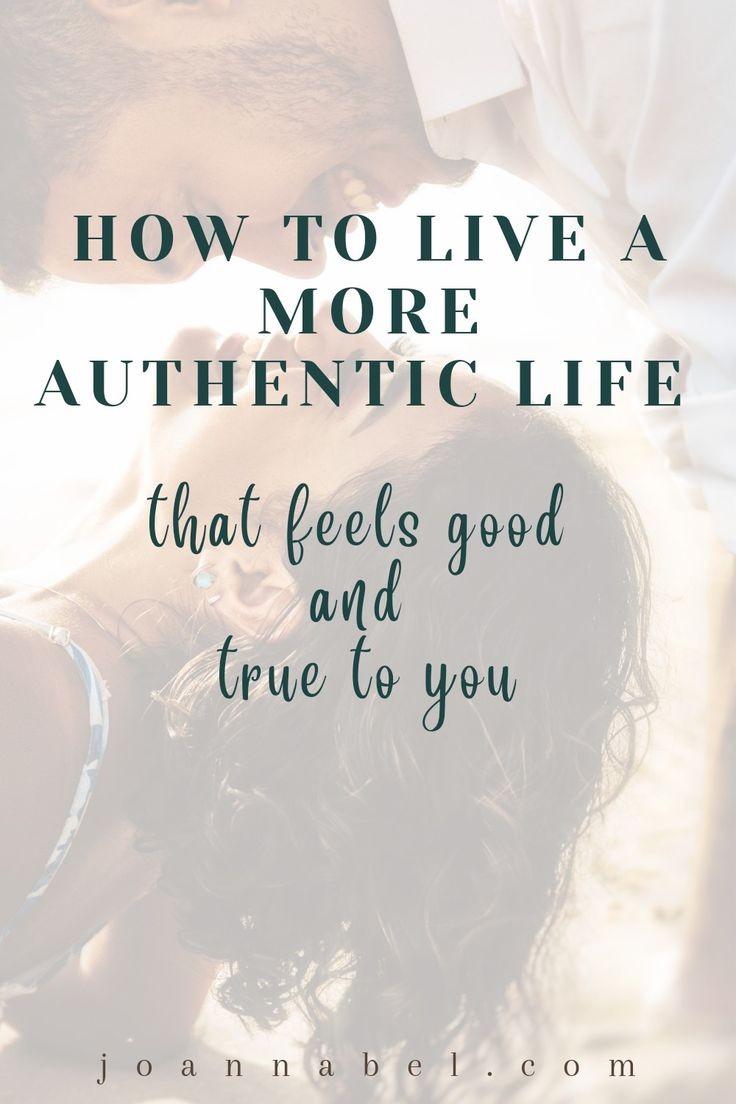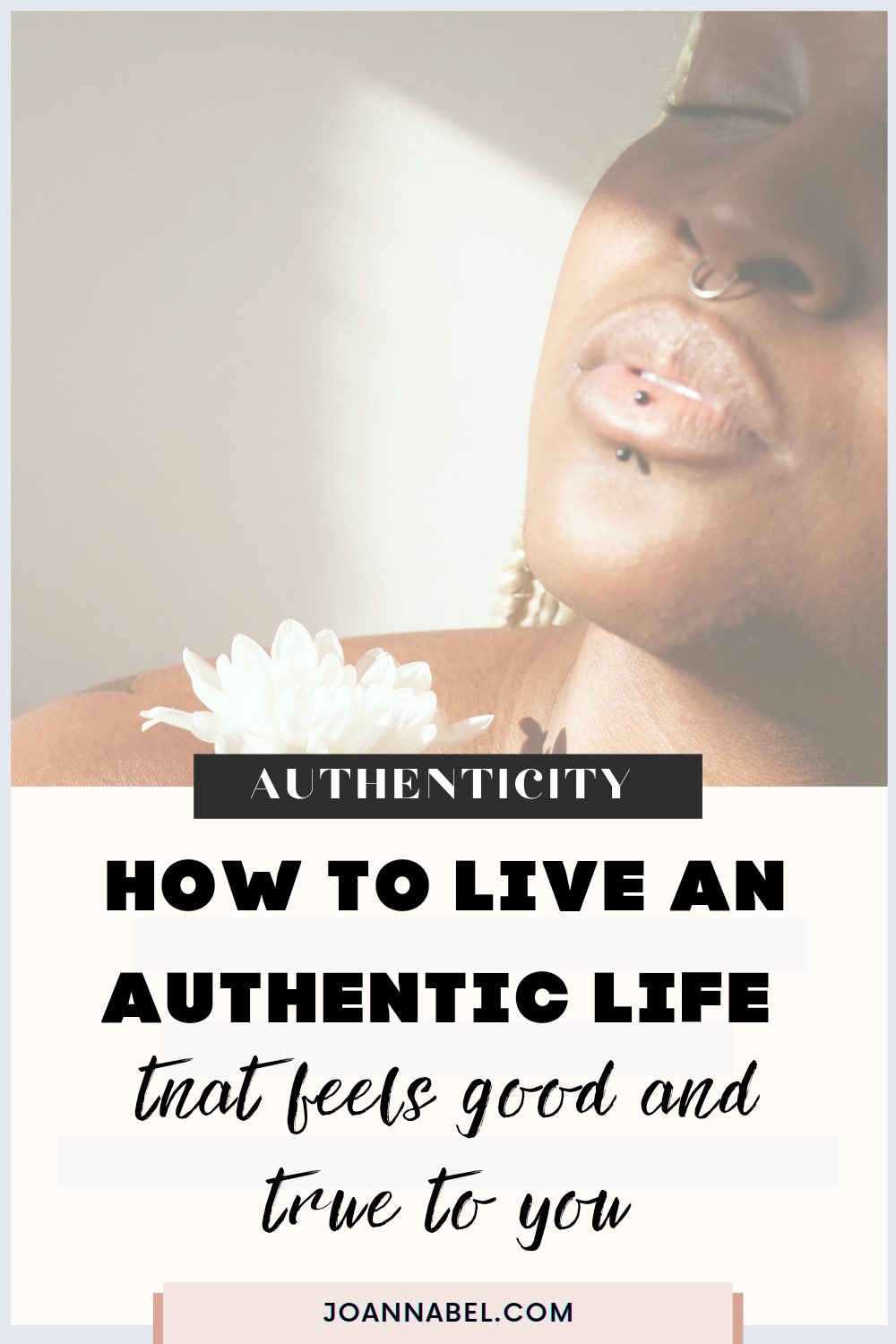If you’re ready to start living a more authentic life, stop your online scrolling, because this post can provide some guidance on how you can finally achieve that.

How To Live An Authentic Life
To live a more authentic life you need to:
- forget about doing what others are doing,
- refrain from overexplaining yourself and your choices to others,
- surround yourself with people for whom you have a genuine interest,
- choose to go where you really want to go,
- develop a healthier relationship with your emotions,
- take responsibility for your doings and your life, and
- discover your purpose.
Throughout the post, I’ll be exposing some patterns that might be keeping you stuck in inauthenticity for too long.
If you’re ready, we should get right to it.
This post has affiliate links which means that we make a commission from qualifying purchases at no additional cost to you. For more information read our Affiliate disclosure.
Note: Although I am a Clinical Social Worker, engaging with this website does not establish a professional social worker-client relationship. The information provided here is for general purposes only and should not be considered professional advice. While we strive to ensure accuracy and reliability, this content is not a substitute for professional guidance. For specific concerns, issues, or situations, it is essential to consult a qualified professional and present your situation. Read the full Disclaimer here.
HOW TO LIVE A MORE AUTHENTIC LIFE

#1 AVOID DOING WHAT OTHERS ARE DOING (FOR THE SAKE OF IT)
To not do what others are doing doesn’t mean don’t learn from others, don’t get inspiration from others, or don’t use other people’s methods. But what it does mean is that you shouldn’t do things that others are doing simply to try to fit in, or avoid feeling uncomfortable due to going your own way that’s different from others around you.
If you’re doing what somebody else around you is doing, like your group of like-minded people who are focused on authenticity, and self-growth that’s unique for each of you, that’s another thing.
Unfortunately, what happens most of the time for people is that they’re following what others are doing, so they either:
- don’t feel left out, even when the choices they’re making are obviously inauthentic, or
- don’t feel discomfort in their body because they’re, for instance, opposing popular opinions, choices, even lifestyles.
And going this route doesn’t feel good, which you’ll know when you realize that you still don’t feel satisfaction nor fulfillment and it keeps happening.
That’s because your choices don’t belong to you.
To make your own choices, you need to learn how to recognize a reason why you’ve taken that particular path, but at the moment when you’re considering taking it.
You need to tune in to understand whether this feels “good” because you’re staying in your lane of conforming. Or it feels right because it’s a good choice for you specifically considering where you are at this moment and where you’re trying to go.

#2 REFRAIN FROM (OVER)EXPLAINING YOURSELF AND YOUR CHOICES
Have you noticed how, when you’re certain of different things in your life, you don’t feel the need to explain yourself too much to others? It’s because you feel confident about it. You feel like you’re skilled to do it, knowledgeable or competent in general.
The same can happen when you’re making authentic choices and living an authentic life. You feel less ,,obligated” to give explanations or to present a pretty picture for others.
On the other hand, when you’re trying to convince others that you’re good, successful, or even beautiful enough, most of the time you’ll be trying to put on a show for others to see so they can get convinced just how great you are. You give your power away.
And at one point you can become insensitive to other people’s experiences, successes, and problems. You start to be a success bomber unintentionally.
What you don’t know when you’re doing all of this is that people can see through you but they are just tolerating you to avoid disagreements or you accusing them of bring jealous of you for example.

All of this means you’re maybe trying to outshine others so you can actually convince yourself that you’re worthy, and it doesn’t have much to do with others.
So here, a good way to go, is to try to recognize when you’re doing these things and don’t go the same route you usually go. Try to self-soothe instead of going the usual way where you compensate for feeling inadequate.
You can learn to self-soothe even if you lack the skills now. You’re really adequate and good enough, but others don’t need to be convinced of this. You do.
#3 SURROUND YOURSELF WITH PEOPLE FOR WHOM YOU HAVE A GENUINE INTEREST
This may sound redundant to say or even obvious, but stick with me here for a moment.
Have you noticed how some people around you tend to connect (even chase relentlessly) with those in positions of power, or who have strength in them, it doesn’t matter if it’s inner strength or it’s physical, but those who seem powerful, even indestructible in a way?
Pay attention because thet probably have trouble relying on themselves to calm themselves, they can’t act independently enough, and tend to indulge in feeling powerless.
And that’s a waste because with more awareness they’d quickly realize they only need to put a little work into becoming more emotionally mature, and things can turn around for them.
Because of these patterns, authenticity is out of reach and they even live in fear. This is why they make their choices mostly to keep them (completely) safe because they don’t know how or believe they can’t self-soothe when things go “wrong”.
You can see how this becomes a vicious cycle very soon, considering things go wrong in life like all the time.
If this is you, that’s OK, it’s just about how you had to adapt to circumstances around you sometime before, most likely while growing up. One way you can help yourself, is to start with understanding how you choose people that surround you and why, and then go from there.
The more you uncover the more opportunity for change you get, so be curious.

The optimal way is to choose supportive, honest, genuine people, you choose for who they are and who you respect. And not because they can make you feel better about yourself or because you can demand them to sacrifice themselves for you.
More importantly, when you have someone supportive in your circle, think about whether you’re supportive of them in a way that feels good for them, not in a way that would feel good just for you. Because the world and people aren’t to be understood or treated just through the prisma of your emotions. Your emotions are only yours.
And you should work on your socio-emotional maturity if:
- you’re choosing people based on what they can do for you,
- you can’t stand (ever) being alone, or
- you can’t stand not being too closely attached to someone to keep you safe and calm. (There’s no problem when we cultivate closeness and dependency, this is needed and beneficial for us.)
By working on it, you will give yourself a chance to experience more authenticity in life in the domain of friendship and relationships.
A good choice might be psychotherapy because a psychotherapist can teach you how to self-soothe, how to understand and deal with anxiety, discomfort, manage your emotions, and reflect on the way you relate to others in terms of respecting their boundaries.
You might be fully unaware you’re struggling just yet, but it’s good to do something about it if you’re frenetically trying to:
- prevent abandond,
- preserve your self image by constantly resisting change, conflicts, and confrontation (because your self-image isn’t stable)
- trying to control everything and everyone around you
- doing too little in the domain of your own self-control and self-reliance
- expecting others to keep nurturing you all the time (cater to your needs non-stop).
This can be a signal of trauma resulting from unmet emotional needs and lack of psychological safety in childhood. And is best to respond to in a safe environment like psychotherapy is.
#4 CHOOSE TO GO WHERE YOU REALLY, TRULY WANNA GO
This also may seem obvious but it isn’t as well. This is a little bit about the fear of missing out and a little bit about not being certain of who you really are or want to be.
Let’s explore this for a moment.
It’s great to make an effort to get to many places in a day (or in life in general), but what are too many? Is it a number or it’s more about a reason that lies behind that particular choice?
Why are you trying to be in all those places – is it not to miss something, control something and don’t feel left behind even when this doesn’t genuinely interest you? Or it’s because this is the place your heart wants to be and it feels exciting, and true?
What happens is that when you want to be at all places (or are afraid others will beat you to it), you usually end up not enjoying any of them truly. Or you are worning yourself down so you can’t make any real progress in your life. Which, down the line, leads to your general dissatisfaction or constant chase for satisfaction.
And then to not feel dissatisfied you might even try to do more of these activities – you now see where this is going. You’re in a vicious cycle.

Instead, try to focus on activities that do contribute to you progress and enrich your life with quality content that feels good because it’s coming from a better place. A place of authenticity.
Slow down for a second a think about:
- Why am I doing this?
- Why am I going to this place?
- Is this a genuine choice or is solely fear-based?
- Does this choice gives me excitement?
- Am I being curious (positive) or prying (lacking)?
Or are you just afraid you won’t have something others have while you don’t even know whether you need it or want it truly, authentically?
Instead take the time to learn more about yourself and your needs, as all those activities steal your attention and are distracting you from, for example, from feeling any discomfort when you’re not doing anything.
Discomfort is just an emotion and it will pass like others do, but more importantly, it’s telling you something about you and the situation you’ve encountered. So go through it to be able to learn to make authentic choices in life in the first place.
If you need to understand what needs are, go read my blog post that speaks about difference between needs and wants, where you can better understand what comes first for us and which of them is stable and which is easily changeable. Here is the link to it.
#5 DEVELOP A HEALTHIER RELATIONSHIP WITH YOUR EMOTIONS
As you’ve probably noticed I’ve mentioned emotional maturity throughout this article a few times and you’re picked up that there’s something to it by now.
And you’re right. To live an authentic life you do have to become more emotionally mature and, as you know, this doesn’t just naturally come with age. You can see kids and young adults that are more emotionally mature than some full-grown adults.
This suggests that we shouldn’t just rely on aging to get more mature – you probably know some people over 65 years of age still immature to this day. I know I certainly do.
So it can happen that we haven’t learned how to deal with more difficult emotions, discomfort, inconvenience, unpleasent things such as frustration etc. But that doesn’t mean we shouldn’t or can’t learn.
Mostly because continuing that route, we’re hurting others around us even if we aren’t aware (because then they have to deal with everything we’re avoiding). But also, we’re preventing our progress and blocking ourselves to live fully and authentically.
You can’t live authentically if you’re not experiencing life to its full extent. And when you keep trying to avoid any inconvenience or hardship this is exactly what you’re doing.
Life causes pain, growth causes pain, and happiness isn’t a life goal, its an emotion like any other.

Without (a little) pain there’s no progress because there’s no learning and there is no growth.
So, to help yourself, start forcing on how you can learn to deal with your emotions. To go through them, and to self-soothe, not avoid them, by either disregarding them, or by engaging in activities that block your pain (for example, drinking). This is just slowing you down and deepening the problem.
Do things even when it feels a bit (or a lot) discomfortable if they bring you where you need to be. Because when you’re only doing things that are (fully) comfortable you’re not moving – and you’re bound to keep doing things that are below your level of achievement.
You can’t get to the next level without “getting your hands a little dirty”.
If you found the information on the blog helpful & inspirational and you feel like giving back, you can do it by clicking the donate button after entering amount you’re comfortable with. I’ll use it to create and deliver more useful content and resources like this. Thanks for your precious contribution!
Related:
#6 TAKE ACCOUNTABILITY FOR YOUR DOINGS AND YOUR LIFE
Having a healthy relation to responsibility in life is important because this way you claim agency and power in your life. This way, you don’t see yourself like a victim of life events. Instead you take control and manage your life actively.
This doesn’t mean you don’t trust life and yourself so you try to control everything and everyone around you. It means you are more responsive and less reactive to things that happen around you. You take them as they are and take responsibility to deal with them and move forward.
You might get into a trap that if you engage in massive self-protecting practices you’ll avoid negative sides of life.
Unfortunately, that’s not how things go. This way you’re only prolonging to deal with your existing problems around your mindset, behavior, managing emotions, anger management, etc.

It’s better to get the skills to deal with challenges in life, because you will not avoid them. So it’s more about focusing on self-control than controling others.
In general, trying to control others excessively (and it’s usually excessively) says that we trust ourselves and pur worthiness less than we should. While at the same time we may try to not let this show, because we don’t want to expose ourselves to a faulty image of ourselves.
Additionally, this way we end up disabling others by not opening the space for them to show their competence or grow it further.
The problems is that when we keep avoiding vulnerability like that and denying to deal with emotional and thought (mis)management, we never get a chance to take responsibility for our situation.
Usually those who act this way have trouble with accepting themselves as they are, but also with tolerating others who don’t behave in the exact way they’d like.
If this is you, start questioning why are you doing this and what is an underlying belief that’s blocking you from connecting with others more healthily. And focus on dealing with emotional/behavioral patterns that support this kind of connection.
I say healthy because going this route creates relationships that don’t feel comfortable for both side because the boundaries keep being disregarded. This can become unhealthy quickly. Soon enough they won’t be able to put up with disrespect of personal boundaries.
So, if you want to live more authentically with othes, it’s highly unlikely that it’ll happen if you:
- do not let others live like they want to live,
- do not accept your flaws and who you are,
- do not focus on your own actions, behavior, and life,
- do not deal with comparing yourself to others compulsively,
- do not deal with controling others in a way that creates a hard-to-handle dynamic,
- can’t accept that others will make mistakes,
- do not focus on self-control, self-soothing, and self-reliance.
YOU MAY ALSO LIKE:
#7 DISCOVER YOUR PURPOSE
Understanding that you need purpose in life is great but it’s not enough. You need to take action to pursue it, and take responsibility, instead of waiting for others or even sacrificing others to achieve it.
You need to be willing to put effort into attaining a purpose not just staying in the wanting phase. Because this is a great feeling but you can’t just get the feeling without making the necessary effort for it to happen.
Your purpose should be oriented toward true (or greater) good, not just relieving your personal pain, unease, discomfort or inconvenience. Besides being the right way to go, as humans we need this.
For example, in trying to block your pain (that comes out of listening about the challenges of others), instead of empathizing and decentering, you might end up in causing more pain to those you supposedly are trying to help.
If you really want to help, you need to forget about how you feel and think about a certain problem. And discover how those who need help are feeling, thinking and what they really want and need.

If you observe things from your perspective only which has nothing to do with their position, you won’t be able to help. And it’s even more likely that you’d cause them more hurt/pain/harm.
You need to forget about seeing things through your own emotions or experiences and ask those who you’re trying to help what would help them, what’s not helpful, and what they really want.
Even if they’re unsure about what they need they most certainly know what they don’t need and don’t want. Or with what they’re comfortable with.
Finding a purpose brings you closer to your true self because it’s in alignment with your deeper calling. And because you’re being who you are, your true essence, you live more authentically.
MY GOOD READS/CLASSES RECOMMENDATION:
- The Self-Love Workbook: A Life-Changing Guide to Boost Self-Esteem, Recognize Your Worth and Find Genuine Happiness (Self-Love Books)
- Self-Love Workbook for Women (paid link): Release Self-Doubt, Build Self-Compassion, and Embrace Who You Are (Self-Help Workbooks for Women)
- How to Be Accountable Workbook: Take Responsibility to Change Your Behavior, Boundaries, & Relationships (5-Minute Therapy)
- Unfuck Your Boundaries: Build Better Relationships Through Consent, Communication, and Expressing Your Needs (5-minute Therapy)
- No More Perfect Moms: Learn to Love Your Real Life
- More Than A Mom: Finding Purpose In the Everyday Monotony Without Losing Yourself Or Your Sanity
Latest Posts:
- The Importance of Play in Child Development

- 5 Hobbies That Will Help You Connect With Your Teens

- A Guide to Balancing Parenting Roles After Divorce

- Gifts for Your Teenager That They’ll Actually Enjoy

- 6 Reasons Your Teenagers Seem Distant and Distracted

- Special Gifts to Let Someone Know You’re Thinking of Them (13)

FINAL THOUGHTS ON HOW TO LIVE MORE AUTHENTICALLY
I hope you find this helpful, please feel free to let me know.
I’d like to recap all 7 tips on show to live more authentically before we part ways for now.
So, they are:
- Avoid doing what others are doing
- Refrain from (over) explaining yourself and your choices to others
- Surround yourself with people for whom you have a genuine interest
- Choose to go where you really wanna go
- Develop a healthier relationship with your emotions
- Take responsibility for your doings and your life
- Discover your purpose.
Thanks for your attention and see you in the next post!
Here’s a recommended one:










Leave a Reply